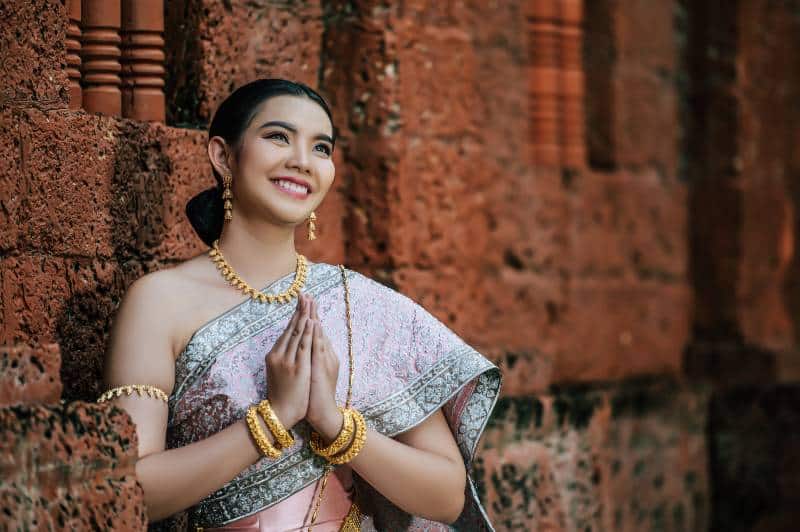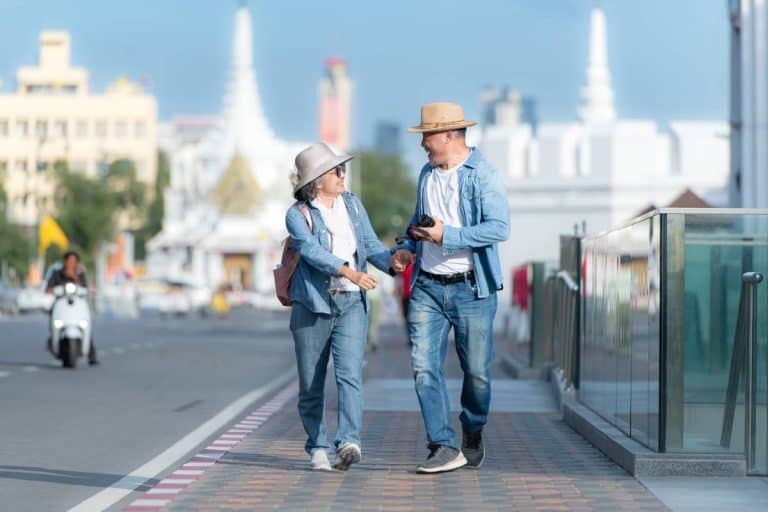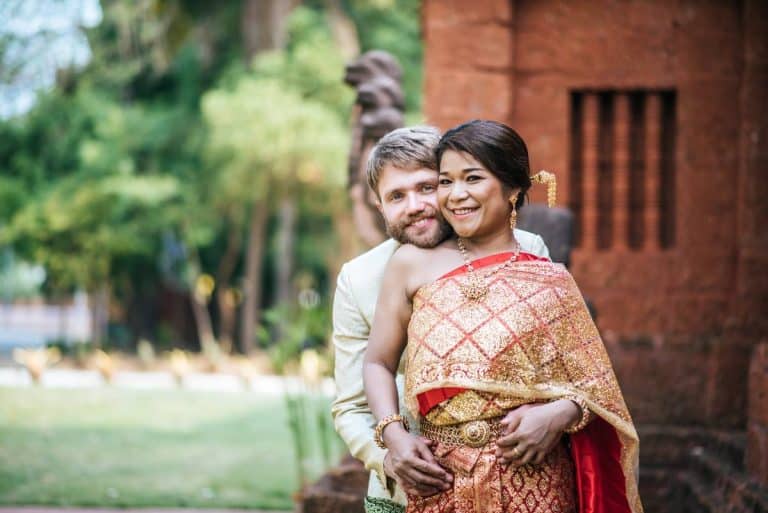Living in a Buddhist Country: Understanding and Respect Thai Culture
When most people think of Thailand, they think of a tropical paradise with golden beaches and swaying palm trees. And while this is certainly true, what many people don’t know is that Thailand is also home to a large Buddhist population. Over 93% of the Thai population identifies as Buddhist. As a foreigner living in Thailand, it’s important to understand and respect Thai culture.
Thailand is known for its incredible hospitality, but it helps to have some knowledge of the country’s rich Buddhist culture so you can accustom yourself accordingly for a smoother transition into living there. In this article, we will cover some of the biggest talking points about understanding and respecting Thai culture when living in a Buddhist Country.
Over 93% of the population in Thailand practices Buddhism, making it the most popular religion there. Though the king is needed by law to be a Theravada Buddhist, Buddhism is the State religion according to the Thai constitution, which yet guarantees religious freedom for all Thai residents.
Key Takeaways
- Thailand is a Buddhist country, with over 93% of the population identifying as such.
- Respect Thai culture by understanding and adhering to cultural norms.
- Learning about Buddhism can help you form meaningful connections with locals and become more familiar with local customs.

Understanding Buddhism in Thailand
The basics of Buddhism and its role in Thai society
Theravada Buddhism is the predominant school of Buddhism that is followed and practiced in Thailand. The refuge is sought in what is known as the “Three Jewels” by adherents of Theravada Buddhism. These are the teacher (Buddha), the doctrine (dhamma), and the monastic community (the Sangha).
The Buddha is not regarded as a “god” in the Theravada school of Buddhism since that school adheres to the Abrahamic understanding of the term. The devotion that one owes to the Buddha is more analogous to the reverence that a pupil feels for a teacher. Respect for the Buddha is an essential tenet for Buddhists who practice the religion in Thailand, and this reverence is enshrined in the country’s legal system by making it illegal to disrespect or deface images of the Buddha.
The “Four Noble Truths” are the foundational teachings (dhamma) of Buddhism. These truths assert that suffering is inherent to all aspects of life and that the “Eightfold Path” is how one might achieve liberation from this condition. Numerous Buddhist ideals, such as tolerance, calmness, and merit, are qualities that can be found throughout Thai society. Buddhism is seen as a philosophy for how one should live life a large number of people in Thailand, and many of these individuals follow Buddhism.
An important institution in Thailand is known as the Sangha. The Sangha is the Buddhist monastic order that consists of ordained monks, nuns, and/or novices. Historically, it was the Sangha’s responsibility to provide the general populace with educational opportunities. Even though Buddhist educational institutions can be found in modern society, the vast majority of them are geared toward people who are interested in joining a monastic community.
In addition, the Sangha makes it possible for laypeople to build up positive karma, which is often referred to as “merit.” For instance, giving alms to monks is a standard part of daily life in Thailand.
This practice symbolizes a reciprocal relationship between the person who bestows the alms (who is rewarded with merit) and the monk who receives the alms (who receives food and is thus able to continue their ascetic practices). In addition, it is not uncommon for families to have a son, usually the youngest, who is training to become an ordained monk in the hope that it will bring merit to the family. When there is a significant life event, such as a wedding, birth, or funeral, the majority of Thai people will go to their neighborhood temple to seek the blessings of the monks.
Nevertheless, the practice of Buddhism in Thailand contributes to the consolidation of the so-called “Thai identity.”
As was just mentioned, Buddhist rituals and ceremonies are an integral part of Thai people’s day-to-day lives. In the same way that images of the king may be seen everywhere in Thailand, Buddhist iconography can be found everywhere. In addition to Buddhist monasteries and spirit houses, many public and private buildings, including government offices, as well as private homes, have images or statues of the Buddha on display.
The younger generation has discovered that they can demonstrate their dedication to Buddhism through the use of social media platforms. In the end, Buddhism in Thailand has long been linked with many institutions, and it offers a feeling of stability by providing a structure for people to build their day-to-day routines around. This has contributed to the spread of Buddhism throughout the country.
How Buddhism is practiced in Thailand, including temple visits and traditional ceremonies
Theravada Buddhism is the state religion of Thailand and is followed by more than 93 percent of the people. It is also widely practiced in neighboring countries such as Laos, Myanmar, and Cambodia. Around the country, one can find traces of this religion in the unlikeliest of settings in the form of unassuming symbols.
Throughout their travels, tourists will be confronted with several examples of Buddhism, from the imposing temples that can be found along the Chao Phraya River to the spirit houses that can be found protecting buildings and other structures all around the country.
Many Thais’ identities would be unthinkable without the influence of Buddhism. The majority of people will make daily offerings to places such as spirit houses. Others will try to accrue virtue by feeding some of the many soi dogs that roam the streets. Many Thais have the belief that if they perform good deeds and accrue merit, they would enjoy longer and more fulfilling lives. In addition, some individuals choose to shield themselves from harm by donning Buddhist amulets.
Around 300,000 monks make their home in the country known as the Land of Smiles. Visitors to Thailand are practically certain to come across at least a couple of them everywhere from Phuket to Bangkok. Their bright yellow and orange robes stand out vividly against the background of today’s clothing options. A good number of Thais will begin their day by presenting offerings to monks who are traveling from place to place in search of financial support.
Before reaching the age of 20, every single guy in Thailand is required to spend at least some time living as a monk. Even though the average duration of stay is approximately three months, some people will only be there for one or two days. The vast majority of monks commit to staying for at least a couple of weeks at a time. Young guys engage in this practice in the hopes of accumulating merit and positive karma.
People in Thailand who are prosperous or who have money are thought to have excellent karma because of this. People who do not have money are believed to have had bad karma in a former life, as a result of which they do not have money in this incarnation.
Respect for Thai Culture
Importance of cultural respect and understanding
Thailand is a country with a long and complex history, as well as many diverse traditions and customs. Many people worldwide have become increasingly fascinated with the unique culture of Thailand. However, in many cases, this admiration has led to disrespectful behaviors toward locals when visitors are ignorant of tradition and etiquette. To truly honor Thai culture and all it has to offer, visitors need to practice respect for the people, their beliefs, customs, and values.
Taking the time to understand the cultural histories of each part of South East Asia you explore will make your travels even more enjoyable and meaningful. Showing respect for Thai culture is an important step in appreciating it fully while having a pleasant and successful experience abroad.
Specific cultural customs and traditions to be aware of
One of the key cultural customs to be aware of when visiting Thailand is the reverence they have for their temples. The temples are sacred places and visitors should dress modestly, cover their heads and treat them with the utmost respect. It is also important to remember that in Thai homes, it is customary to remove one’s shoes; this same practice applies in temples as well.
Additionally, physical contact is not as commonplace as it may be in some other countries – shaking hands, giving hugs, and touching your feet, or others’ heads are all frowned upon and can be considered disrespectful. Thus, when interacting with locals in Thailand, keeping a good distance between yourself and those around you is important to maintain proper etiquette.
Mention cultural taboos to avoid
In Thai Culture, it is important to understand and adhere to various cultural taboos. These taboos are kept in mind to ensure respect for the culture of Thailand and its locals. To avoid offending, visitors need to make sure that they never touch another person’s head, as this is seen as immensely disrespectful.
Similarly, raising one’s feet high – even if it simply means propping them on the arm of a chair – should also be avoided. Shoes must also be removed before entering someone’s home or a religious site such as a temple. Sacred Buddhist items or Thai currency should never be disrespected or talked down upon, and walking or sitting while the national anthem is playing is strictly forbidden.
Finally, Insulting another person’s parents in any way will likely have consequences starting with an apology at the very least. Therefore, understanding and respecting these customs can help make traveling to Thailand an enjoyable experience for all involved.
Thai Customs and Traditions
Thai customs and traditions, such as traditional festivals and ceremonies
Thailand is well-known for its many festivals and other events, many of which are excellent examples of the country’s long-standing cultural and traditional traditions. Even while many of Thailand’s celebrations have their roots in local customs and folklore, the majority of them are connected to Buddhist and Brahman beliefs. Over a year, numerous events took place over several centuries.
In Thailand, an array of vibrant festivities take place throughout the year including Chakkri Day, Chulalongkorn Day, the queen’s birthday and king’s birthday celebrations (Thai royal family), Coronation Day observances, Songkran (The Water Festival), Visakha Bucha (Buddha’s Birthday) commemorations, Krathong (Festival of Lights), Magha Puja rituals and the magnificent Yi Peng Festival. These are only some of the renowned festivals celebrated in this wonderful country!
The traditional Thai way of life
The belief system and ideals of Buddhism have a significant influence on day-to-day living because over 93% of the population adheres to the Theravada school of Buddhism. Etiquette is treated with utmost significance in Thailand.
Respect, self-control, and an attitude of non-confrontation are three of the most fundamental principles that people in Thailand uphold and believe in everywhere they go in the country.
Explain the significance of Thai food
In Thailand, food plays a significant role in all types of social gatherings; in fact, it frequently catalyzes the social gathering itself or a reason to rejoice. This is due in part to the gregarious and social nature of Thai people, but it is also the result of how food is ordered, presented, and consumed in Thai culture. Thai dishes are a unifying and sharing experience for families and friends.
for example, one of the most well-known dishes is pad thai. This beloved meal is often eaten as street food and has become increasingly popular in the West due to its abundance of flavors.
Read on here to learn more about the food in Thailand! This guide will help you discover the amazing flavors that Thai food offers. We’ll explore the unique ingredients, cooking methods, and signature dishes of this vibrant cuisine. You’ll learn about traditional recipes passed down through generations, as well as modern takes on classic dishes. So let’s dive in and start exploring!
Living in Thailand
Share tips for living in Thailand
Living in Thailand is a unique experience. The people are friendly, the food is delicious, and the weather is perfect. However, there are some things you should know before you go:
- Thailand is hot! Bring light clothing and sunscreen.
- Don’t expect to get by on English alone—you will need to learn some Thai.
- Remember that the culture is very different than your own. You will need to be open-minded to enjoy living here.
- Checking out this article for tips is a great way to improve your lifestyle and make sure that you are living the best possible life. Taking advantage of the resources available online can provide you with an abundance of advice, knowledge, and ideas that can help you move forward in life.
Offer advice for navigating cultural differences
When you travel throughout Thailand, you will very immediately become aware of the many variations that exist there. Things include Thais saying hello to one another, showing respect to one another, apologizing to one another, and saying farewell with a gesture known as the wai, rather than shaking hands. The culture of Thailand has a wide variety of peculiarities, both large and tiny. Here are some instances.
There is a far stronger emphasis placed on extended Thai families in Thailand than there normally is in western countries, where it is more common for the nuclear family to take precedence. There is no term in Thai for cousins, thus Thai people refer to their cousins as their brothers and sisters. If you meet a Thai person and are surprised by the number of siblings they have, it is quite likely that many of those siblings are cousins.
It is common for extended families to reside near one another, and many Thais continue to keep tight ties with the areas from whence they originated even after moving away for employment. Because of the important role that extended family plays in day-to-day living, it is not uncommon for children to be raised by their grandparents or aunts and uncles if their parents are required to work outside the home. It is expected that younger family members will pitch in to support older family members with their care. This can be accomplished monetarily or by the completion of a variety of tasks.
The people of Thailand are known for their friendliness and openness, as well as their preference for peaceful resolution of disputes. Imagine two people trying to resolve a problem without directly addressing the problem and continually skirting around the fundamental reason. This can lead to many intriguing conversations.
Respect, self-control, and an unwillingness to engage in conflict are considered to be the most essential values held by Thai people. A significant deal of embarrassment can be brought upon a Thai person if they lose face by displaying rage or by stating a lie. The Thai people tend to approach everything with a “Sabai Sabai” mentality, even their social relationships, which are less formal than in other countries.
The concept of Sabai Sabai refers to a way of thinking that holds the belief that everything takes place for a specific reason and that things will, in the end, turn out for the best. In addition, it serves as a little nudge to remind us not to worry or stress too much and to let go of the things over which we have no control.
It is not always easy for us to articulate how they truly feel about a certain topic, and I believe that this is because of their desire to protect everyone’s dignity and make sure that nobody is hurt or insulted in any way. They also have a culture that is incredibly tolerant and accepting, and they celebrate those who are unique.
Discuss the benefits of living in a Buddhist country
By practicing meditation, one can gain greater control over their mental state and reduce feelings of stress, anxiety, and depression. Various techniques such as deep breathing or yoga postures allow people to take a step back from unhelpful thoughts to observe them objectively before letting them go. In essence, it is an act of training the mind which has been scientifically shown to bring many positive benefits for well-being on both physical and emotional levels.
According to Demers, the fundamental precepts of Buddhism focus on cultivating kindness, humor, and compassion in one’s interactions with other people. There should be no objective other than to help the person in need, according to one of the fundamental precepts held by Buddhists.
In Buddhist thought, there is no hierarchy of human beings. An expert on Buddhism named Jason Henninger noted in an interview with Health Central that the religion “gives a person a feeling of being a wave in the ocean rather than feel like one’s life is an isolated occurrence.” “A wave is a wave, yet it is not independent of the other water in the ocean. The practice of Buddhism instills in its followers a profound sense of oneness, but not at the expense of their identities, and never in terms of one’s superiority or inferiority to others.
Understanding and Respect Thai Culture FAQs
What is considered most respectful in Thailand culture?
“Wai” is the term used to describe the customary hand motion used to greet someone in Thai culture. To perform a way, bring the palms of one’s hands together in the shape of a prayer and bowed your head. The wai is regarded as being more courteous when the hands are held closer to the head.
What is considered rude in Thai culture?
It is considered impolite to point at another person with either one’s index finger or one’s feet. It is impolite to point one’s toes or the soles of one’s feet in the direction of another person. Sitting in a way that prevents this from happening is the best option. A person should also avoid resting their feet on tables or cushions that are used for sleeping.
What values are important in Thailand?
Thailand’s culture is marked by a strong emphasis on respect, self-control, and avoiding conflict. Instead of expressing anger or telling falsehoods that could disgrace them, Thai people choose to remain stoic even in difficult circumstances – an admirable trait appreciated around the country.
What is the attitude of the Thai people?
People from Thailand are known for their legendary hospitality, confidence, and affable nature. They always strive to uphold the highest level of etiquette while exhibiting modesty, cheerfulness, and deep respect toward others. Maintaining dignity is an integral part of Thai culture that binds together its faithful citizens with distinct character traits such as politeness and gratitude – making them truly unique!
How do you understand Thai culture?
To get a real feel for the culture of Thailand, you need to explore its people and history. Learning about the Thai language, and learning many Thai customs and traditions are essential; as well as becoming familiar with how Thais interact socially in different settings – always bearing respectfulness towards others at heart. To gain further insight into the Thai lifestyle delve even deeper by reading books or watching films related to the country’s heritage!
Conclusion
By taking the time to learn about Thai culture before their travels, visitors can create much more meaningful connections with the country and its people. The best way to learn is by actively looking for opportunities to immerse oneself in the culture, rather than just passively reading or hearing about it from someone else. With this attitude of respect and openness, everyone stands to gain something from their experience in Thailand.
Are you interested in learning more about Thai culture? Subscribe to our newsletter for the best information about living in Thailand or visit our website for more blog posts on this topic.






